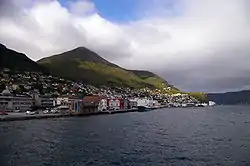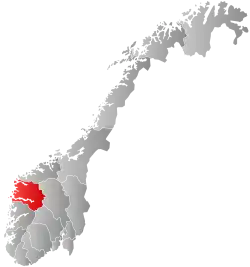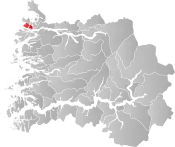Sør-Vågsøy
Sør-Vågsøy is a former municipality in the old Sogn og Fjordane county in Norway. The municipality existed from 1910 until 1964 and it encompassed the southern part of the island of Vågsøy and a small area on the mainland just east of the island. The area is now located in the present-day Kinn Municipality in Vestland county. The administrative centre of the municipality was Måløy, where Sør-Vågsøy Church is located. Other population centres in the municipality are the villages of Holvik, Vågsvåg, Torskangerpoll, Færestrand, and Ytre Oppedal.
Sør-Vågsøy herad
Søndre Vaagsø herred (historic) | |
|---|---|
 View of Måløy | |
 Sogn og Fjordane within Norway | |
 Sør-Vågsøy within Sogn og Fjordane | |
| Coordinates: 61°56′07″N 05°05′49″E | |
| Country | Norway |
| County | Sogn og Fjordane |
| District | Nordfjord |
| Established | 1 Jan 1910 |
| • Preceded by | Selje Municipality |
| Disestablished | 1 Jan 1964 |
| • Succeeded by | Vågsøy Municipality |
| Administrative centre | Måløy |
| Population (1964) | |
| • Total | 3,926 |
| Demonym | Vågsøyværing[1] |
| Time zone | UTC+01:00 (CET) |
| • Summer (DST) | UTC+02:00 (CEST) |
| ISO 3166 code | NO-1439 |
History
Sør-Vågsøy was originally a part of the municipality of Selje (see formannskapsdistrikt law). On 1 January 1910, the western part of the municipality of Selje was split off into the two new municipalities of Sør-Vågsøy and Nord-Vågsøy. Sør-Vågsøy had an initial population of 1,517. On 1 July 1921, the Blesrød farm in Nord-Vågsøy (just north of Måløy) was transferred to Sør-Vågsøy. During the 1960s, there were many municipal mergers across Norway due to the work of the Schei Committee. On 1 January 1964, the new Vågsøy Municipality was created by merging the municipalities of Sør-Vågsøy (population: 3,926) and Nord-Vågsøy (population: 1,476) with parts of the neighboring municipalities of Davik and Selje.[2]
Name
The municipality is named Sør-Vågsøy since it encompasses the southern part of the island of Vågsøy (Old Norse: Vágsey). The prefix is sør which means "southern". The first element of the name is the genitive case of vágr which means "bay" or "inlet". The last element is ey which means "island". Historically, the name was spelled Søndre Vaagsø. Prior to the 1917 Norwegian language reform law, the name was spelled with the digraph "aa", and after this reform, the letter å was used instead. Also around that time, the letter y was added to the end of the word to "Norwegianize" the name (ø is the Danish word for "island" and øy is the Norwegian word). The prefix was also modified from Søndre to Sør-, using an alternate way of spelling the same thing.[3][4]
Government
During its existence, this municipality was governed by a municipal council of directly elected representatives. The mayor was indirectly elected by a vote of the municipal council.[5]
Municipal council
The municipal council (Heradsstyre) of Sør-Vågsøy was made up of 29 representatives that were elected to four year terms. The party breakdown of the final municipal council was as follows:
| Party Name (in Nynorsk) | Number of representatives | |
|---|---|---|
| Labour Party (Arbeidarpartiet) | 6 | |
| Conservative Party (Høgre) | 8 | |
| Christian Democratic Party (Kristeleg Folkeparti) | 2 | |
| Liberal Party (Venstre) | 3 | |
| Local List(s) (Lokale lister) | 10 | |
| Total number of members: | 29 | |
| Party Name (in Nynorsk) | Number of representatives | |
|---|---|---|
| Labour Party (Arbeidarpartiet) | 7 | |
| Conservative Party (Høgre) | 7 | |
| Joint List(s) of Non-Socialist Parties (Borgarlege Felleslister) | 4 | |
| Local List(s) (Lokale lister) | 11 | |
| Total number of members: | 29 | |
| Party Name (in Nynorsk) | Number of representatives | |
|---|---|---|
| Labour Party (Arbeidarpartiet) | 4 | |
| Conservative Party (Høgre) | 4 | |
| Liberal Party (Venstre) | 4 | |
| Local List(s) (Lokale lister) | 8 | |
| Total number of members: | 20 | |
| Party Name (in Nynorsk) | Number of representatives | |
|---|---|---|
| Labour Party (Arbeidarpartiet) | 4 | |
| Liberal Party (Venstre) | 2 | |
| Joint List(s) of Non-Socialist Parties (Borgarlege Felleslister) | 3 | |
| Local List(s) (Lokale lister) | 11 | |
| Total number of members: | 20 | |
| Party Name (in Nynorsk) | Number of representatives | |
|---|---|---|
| Labour Party (Arbeidarpartiet) | 3 | |
| Local List(s) (Lokale lister) | 17 | |
| Total number of members: | 20 | |
| Party Name (in Nynorsk) | Number of representatives | |
|---|---|---|
| Labour Party (Arbeidarpartiet) | 6 | |
| Liberal Party (Venstre) | 2 | |
| Local List(s) (Lokale lister) | 12 | |
| Total number of members: | 20 | |
| Note: Due to the German occupation of Norway during World War II, no elections were held for new municipal councils until after the war ended in 1945. | ||
Mayors
External links
 Sogn og Fjordane travel guide from Wikivoyage
Sogn og Fjordane travel guide from Wikivoyage
References
- "Navn på steder og personer: Innbyggjarnamn" (in Norwegian). Språkrådet.
- Jukvam, Dag (1999). Historisk oversikt over endringer i kommune- og fylkesinndelingen (PDF) (in Norwegian). Statistisk sentralbyrå. ISBN 9788253746845.
- Askheim, Svein, ed. (2017-06-02). "Vågsøy". Store norske leksikon (in Norwegian). Kunnskapsforlaget. Retrieved 2017-10-22.
- Rygh, Oluf (1919). Norske gaardnavne: Nordre Bergenhus amt (in Norwegian) (12 ed.). Kristiania, Norge: W. C. Fabritius & sønners bogtrikkeri. p. 399.
- Hansen, Tore; Vabo, Signy Irene, eds. (2022-09-20). "kommunestyre". Store norske leksikon (in Norwegian). Kunnskapsforlaget. Retrieved 2023-01-01.
- "Kommunevalgene og Ordførervalgene 1959" (PDF) (in Norwegian). Oslo: Statistisk sentralbyrå. 1960. Retrieved 2020-02-16.
- "Kommunevalgene og Ordførervalgene 1955" (PDF) (in Norwegian). Oslo: Statistisk sentralbyrå. 1957. Retrieved 2020-02-16.
- "Kommunevalgene og Ordførervalgene 1951" (PDF) (in Norwegian). Oslo: Statistisk sentralbyrå. 1952. Retrieved 2020-02-16.
- "Kommunevalgene og Ordførervalgene 1947" (PDF) (in Norwegian). Oslo: Statistisk sentralbyrå. 1948. Retrieved 2020-02-16.
- "Kommunevalgene og Ordførervalgene 1945" (PDF) (in Norwegian). Oslo: Statistisk sentralbyrå. 1947. Retrieved 2020-02-16.
- "Kommunevalgene og Ordførervalgene 1937" (PDF) (in Norwegian). Oslo: Statistisk sentralbyrå. 1938. Retrieved 2020-05-11.
- "Ordførarar i Vågsøy kommune". NRK Fylkesliksikon (in Norwegian). 2003-11-20. Retrieved 2023-06-20.

